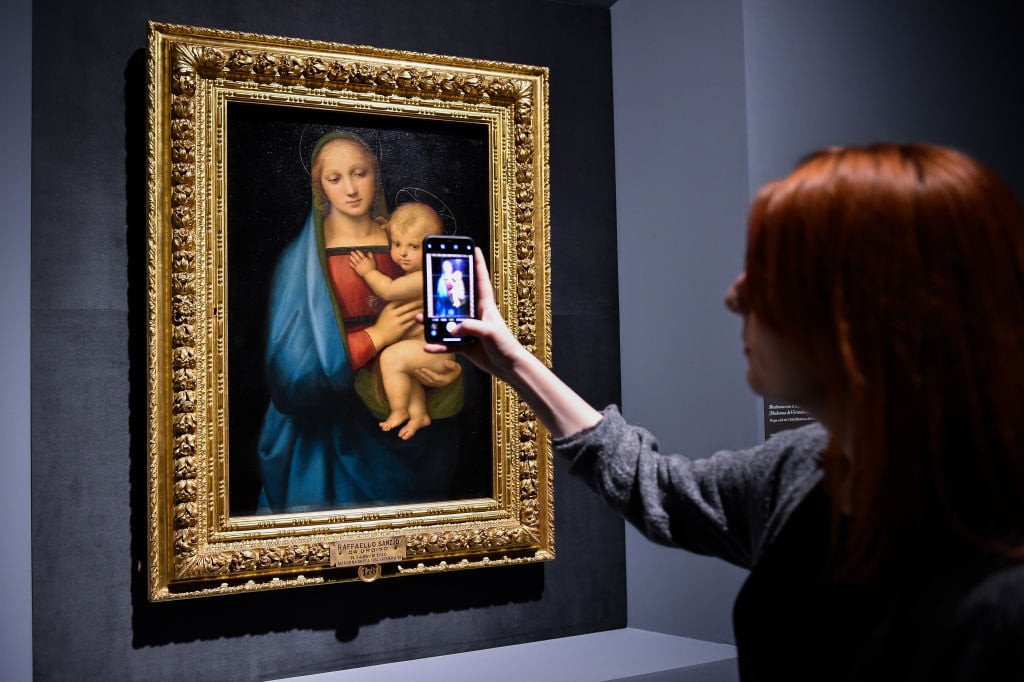
A Raphael exhibition in Rome featuring 120 masterworks by the artist has been forced to close within days of opening as Italy takes radical steps to contain the spread of the coronavirus. All of the country’s museums have been shuttered in an effort to fight the epidemic, and some 16 million people have been placed in quarantine.
The Raphael show at the Scuderie del Quirinale in Rome opened on Wednesday but closed down on Sunday, March 8, after the Italian prime minister, Giuseppe Conte, declared that all museums, together with major heritage sites, such as the Colosseum in Rome and Pompeii archaeological park near Naples, must shut until April 3. Schools, gyms, and cinemas have also closed, and soccer matches are being played in empty stadia.
The sweeping closures affect all museums across the country, including the Vatican Museums, Galleria Borghese in Rome, and the Uffizi in Florence. Private museums, such as the Fondazione Prada in Milan, and the Pirelli HangarBicocca, which had reopened after a week’s enforced closure, and have now shut again. In Venice, François Pinault’s private museums, the Palazzo Grassi and Punta della Dogana are also closed, and all events have been cancelled.
Rome’s Raphael exhibition, which marks the 500th anniversary of the artist’s death, had been in the works for years. A record 70,000 tickets had been sold ahead of its highly anticipated opening. The show includes works on loan from the Louvre in Paris, National Gallery in London, and the Royal Collection, as well as 40 from the Uffizi, which is co-organizing the exhibition. The scientific committee of the Florence art museum resigned en masse in protest at the loan of Raphael’s 1518 portrait of Pope Leo X because it deemed it too fragile to travel.
The government has placed all residents of the Lombardy region, the epicenter of the country’s outbreak, in lockdown. This includes the region’s capital city, Milan. Fourteen other central and northern provinces, including Venice, are also affected. People are not supposed to travel to and from the affected areas unless they obtain special permission. Road blocks and checkpoints have been put in place to deter people from dodging the ban.
Residents of the quarantined zones have been asked to remain housebound where they can, and to refrain from all-but-essential travel. Cafés and restaurants in the areas are still being permitted to open between 6 a.m. and 6 p.m., but customers are being asked to stay at least three feet apart. Those breaking quarantine face three months in prison.
Tourists wear face protective masks during the Coronavirus emergency in Rome. Photo by Antonio Masiello/Getty Images.
The emergency measures are the most serious that have been taken outside of China, where the deadly virus was first reported. Italy has borne the brunt of the virus so far in Europe. The number of cases had reached 7,375 by time of writing with 366 deaths as the number continues to grow.
As much of Italy becomes a no-go zone, the economic impact from the loss of tourism, which accounts for around 13 percent of the country’s economy, will be severe. Individual museums’ expected income from admissions look set to plummet. The government has promised to increase spending as a “massive shock therapy” to offset the financial impact of the outbreak.
The Louvre Goes Cash-Less
Elsewhere in Europe, the Louvre has cautiously reopened after employees forced it to close for three days last week. Visitors from affected regions are being invited to hold off on visiting the museum, and the institution has introduced a cashless policy to allay staff fears that banknotes could play a role in spreading the infection.
In the UK, there have been 280 confirmed cases of the disease, and three deaths so far, including a man who had recently returned from Italy. The UK prime minister Boris Johnson is holding an emergency meeting today to consider the necessity of “social distancing” measures, including banning large-scale gatherings, closing schools, and encouraging home working. The culture secretary Oliver Dowden has stressed that the UK is still in the “contain” phase. He told BBC Radio there is “no need” for people to avoid museums.
An exhibition of works from the Sharjah Art Collection in London has been cancelled along with a conversation with the Turner-prize winning artist Lubaina Himid because of Covid-19. Both were organized by the Sharjah Art Foundation, and were due to take place at the Royal College of Art this week.